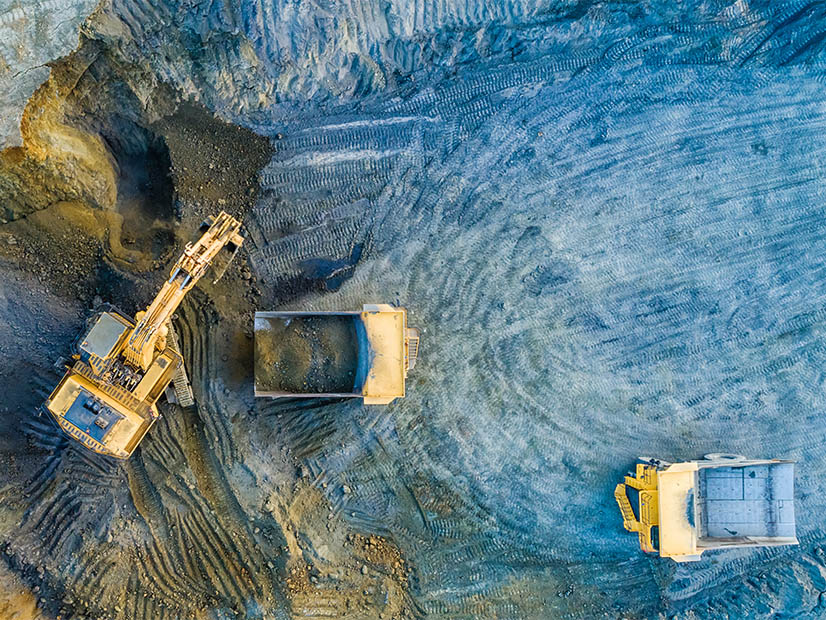The White House on Thursday announced that President Biden had invoked the Defense Production Act (DPA) to step up production of rare minerals that are critical components of the transition to electric vehicles, fuel cells and green hydrogen production.
The announcement came the same day that the Senate Energy and Natural Resources Committee heard from a domestic uranium mining company, a metals mining company based in Minnesota, a D.C.-based minerals trade group and a U.S. Geological Survey expert who explained that a list of “critical minerals” vulnerable to foreign supply disruption has grown in the last four years.
Committee Chair Joe Manchin (D-W.Va.) noted that he and other senators had asked the president to invoke the DPA, a Cold War-era law enacted in 1950 authorizing the president to order private companies to prioritize production for the government.
Ranking Member John Barrasso (R-Wyo.) complained that the administration has made it more difficult to mine domestically and called for Biden to ban imports of Russian uranium as he had proposed earlier.
“Currently it takes an average of 10 years to permit a new mine in the United States and [Biden] wants all of this [decarbonization of the economy] in place in eight years. It just doesn’t add up,” Barrasso said. “If President Biden doesn’t reverse course and stand up to the mining opponents in his own party, it’s only going to get worse. It will mean that we will continue to fund our adversaries as we are doing today with Russia.”
Biden’s invocation, along with his announcement that he would withdraw 1 million oil barrels per day from the Strategic Petroleum Reserve for U.S. refineries in view of the global oil shortage, drew Manchin’s immediate support after the hearing. Barrasso dismissed the move and again called for Biden to ban imports of Russian uranium.
During the hearing, Scott Melbye — executive vice president of the Uranium Energy Corp., based in Corpus Christi, Texas, and president of the trade group American Producers of America — testified that Russia, Kazakhstan and Uzbekistan “now supply nearly half of the uranium consumed by U.S. nuclear utilities.”
“We estimate that more than $1 billion per year in nuclear fuel purchases are flowing from the United States to Rosatom, the Russian State Atomic Energy Company, which is an extension of the Kremlin and clearly part of the Russian military complex.
“It’s simply unconscionable to allow U.S. uranium purchases to continue funding the Putin war machine,” he said, adding that his group supports a ban on Russian uranium imports.
Steve Fortier, director of the USGS’ National Minerals Information Center, said that while the U.S. remains a major mineral producer, the agency has determined that the nation’s industries are “100% import-reliant for 17 mineral commodities and at least 50% import-reliant for an additional 30 mineral commodities.”
“The United States depends on unreliable foreign sources for many of the strategic and critical materials necessary for the clean energy transition, such as lithium, nickel, cobalt, graphite and manganese for large-capacity batteries. Demand for such materials is projected to increase exponentially as the world transitions to a clean energy economy,” Fortier said.
Abigail Wulf, director of the Center for Critical Minerals Strategy at D.C.-based Securing America’s Future Energy, said the U.S. is losing to China on mining and mineral processing.
“China is the world’s largest processor of copper, nickel, cobalt, lithium and rare-earth elements, and they control 60% of anode production and 40% of global cathode production. Consider that in 2019, about 70% of the world’s cobalt supply was mined in [China]. But more than 70% of that cobalt was refined in or controlled by China. The first metric is an act of nature. The second is an act of policy,” she said.
Julie Padilla, chief regulatory officer for Twin Metals, said that despite the president’s enthusiasm about more domestic mineral production, the federal bureaucracy, namely the departments of Agriculture and the Interior, have continued to block development.
“If this country wants to produce its own nickel, it has to mine in Minnesota. If we want our own cobalt, platinum and palladium, we have to get it in Minnesota,” she said. “Northeastern Minnesota, where Twin Metals has proposed to operate, sits on top of the largest undeveloped deposit of these minerals in the world. The area contains a stunning 95% of the U.S. nickel resources, 88% of our cobalt, 75% of our platinum group metals and a third of the country’s copper.
“But the United States will not be able to do that under the current regulatory process that is unpredictable, subject to political manipulation, with changing rules in each administration and in conflict with the priorities of our nation. It’s past time for Congress to take action,” she said.
Paul Ziemkiewicz, director of the West Virginia Water Research Institute at West Virginia University — and the only witness to come to the committee with good news — said researchers have developed a process to pull rare and critical minerals out of acid mine drainage.
He said the university is now building a 1,000-gallon-per-minute plant near an old mine in the state to test the process.
“We see this as an opportunity to recover value in the treatment of acid mine drainage rather than simply spending money for an environmental useful purpose,” he said.
The university is also working with officials in Montana, he added, and the early analysis is promising.
“We have a relationship with the Montana resources at Butte, Mont. We’ve characterized the acid mine drainage coming into the Horseshoe Bend plant there. It’s an excellent resource, and the interesting thing is the makeup of the rare-earth elements coming into these hardrock mines and coal mines are almost identical.
“And when I say identical, they’re not only the same distribution of elements, but it’s heavily skewed toward the heavy rare-earth elements. The Chinese … are desperate to get their hands on heavy rare-earth elements.”



